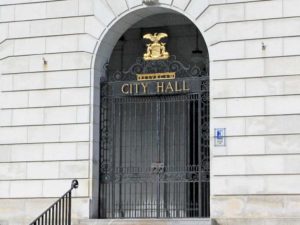By Tony Zeli
In the fall of 2019, the city council decided to send the issue of a charter commission to the Portland voters. Now, voters will face the commission’s proposals as a series of eight city charter questions.
The city council created the charter commission in lieu of a citizen initiative ballot question to enact municipal clean elections after a successful signature drive. The charter commission was approved by voters in June 2020. The following summer, in June 2021, Portland voters elected nine commissioners (another three were appointed by the city council).
The commission had the authority to recommend any change to the charter. So, they went forward to address many issues in addition to clean elections over the following year. In particular, the commission took on the long running debate over what powers the city’s mayor should have, who controls the school budget process, updates to ranked choice voting, non-citizen voting rights in local elections (which did not move forward), and changes to the number and size of city council districts.
Ultimately, the proposals go before the voters of Portland on November 8th as a series of eight city charter questions. Amendments to the charter are grouped under these ballot questions, any one of which can pass separately with or without the successful passage of the others. Here is a summary of the questions with important details.
City Charter Questions
Question 1 – Preamble & Land Acknowledgement
Question 1 would redraft the Portland City Charter’s Preamble to read:
We, the people of Portland, Maine, establish this Charter to secure the benefits of local governance and to provide for the health, safety, and common good of all people in our community. In so doing, we seek to build a representative, responsive, and effective government that encourages leadership and participation from all members of that community, with an emphasis on accountability, equity, and inclusion, and a system of public education that supports Portland’s civic, intellectual, cultural, and economic life.

Also, Question 1 adds a land acknowledgment that reads:
Portland is located in the unceded territory of the Aucocisco Band of the Wabanaki, which also includes the Abenaki, Maliseet, Mi’kmaq, Passamaquoddy, and Penobscot people. European colonizers displaced Wabanaki people by force and went on to displace and harm indigenous peoples throughout what is now Maine and the United States. We acknowledge that displacement and that harm with sorrow, even as we celebrate and honor the Wabanaki knowledge and culture that continue to thrive in the Tribal Nations that have and always will call this place, the Dawnland, their home.
Question 2 – Mayoral Powers & City Political Districts
Question 2 creates an executive mayor, replaces the city manager with a chief administrator, increases the number of seats on city council and school board from nine to twelve, and calls for the creation of a participatory budget process.
THE EXECUTIVE MAYOR

If passed, this proposal creates an executive mayor with new powers. Currently the mayor is more of a super-city councilor and the city manager runs the city. As proposed, the city manager is replaced by a chief administrator who oversees city departments and can remove department heads in consultation with the mayor.
The mayor receives new powers, including:
- Nominates and can remove the newly created chief administrator
- Nominates for appointment all department heads
- Veto power over the city budget and ordinances (subject to override by 2/3 vote of the city council)
- Recommends rules to govern communications between city staff and elected officials
- Introduces legislation to the city council
Question 2 also increases the mayor’s salary from at least 1.5 times to 2 times the median household income in the city, and it raises school and city council pay to a minimum of 10% of the mayor’s salary. As of 2020, the median household income for Portland was $61,695.
CITY COUNCIL & SCHOOL BOARD
The proposal increases the size of the city council and school board from a total of 9 to 12 seats. The new composition would include 9 district seats (up from the current 5) while keeping 3 at-large, or citywide, councilors.
The council can censure or remove the mayor for cause or call for a recall election by super-majority vote. The proposal also creates a new city council chair and co-chair to preside over meetings and set the agenda, roles currently performed by the mayor.
The city council would retain the power to review the performance of other city heads (not the chief administrator), meaning the corporation counsel and city clerk.
BUDGETS
Question 2 establishes a joint committee on budget guidance consisting of 4 city councilors and 4 school board members. It also directs the city council to create a participatory budget process that involves the public as much as possible.
A new capital improvement plan (CIP) process requires the chief administrator to plan for future large expenditures in coordination with the superintendent of schools.
Another change grants power to the city council to appoint vacated seats if the vacancy occurs within six months of the next election. Otherwise, there would be a special election.
Question 3 – Clean Elections & Ban on Corporate Contributions
Question 3 directs the city council to create a voluntary public financing system for municipal campaigns. To participate, candidates must accept limits to the amount of funds they can raise, meet public support requirements, agree to participate in a city funded candidate forum, and return all unused funds to the clean election fund.
This proposal also prohibits corporations and their PACs from contributing to any candidate for municipal office. Also, it prohibits ballot question committees from receiving contributions from entities under foreign influence.
If passed, Question 3 requires the city clerk to create a searchable online database that voters can access to view financial filings from candidates and ballot question committees.
Question 4 – Proportional Ranked Choice Voting
For elections in which candidates are running for multiple seats, Question 4 directs the city council to establish proportional ranked choice voting. With the change, candidates are elected based on thresholds determined by the number of seats to be filled rather than a simple majority.
Question 5 – School Board Budget Autonomy
Question 5 takes the school budget authority away from the city council and gives it to the school board. The city council can conduct a public hearing and make recommendations to the school board. The budget still goes before voters, currently because of state law, but if passed it becomes codified in the charter.
Question 6 – Peaks Island Council
Codifies in the charter the Peaks Island Council, an advisory committee to the city council, currently established by city ordinance.
Question 7 – Civilian Police Review Board
Question 7 replaces the current Police Citizens Review Subcommittee with a civilian police review board consisting of at least 9 members appointed by the city council, including 3 non-voting members, and one selected by the mayor. As proposed, the board receives complaints directly from the public and passes them on to the police department or internal affairs. The police review board can then review the police or internal affairs findings and issue their own reports.
Question 7 requires funding for staff, including a community liaison and a police liaison.
Question 8 – Ethics Commission and Code of Ethics
Requires the city council to form an independent seven-member Ethics Commission, who would recommend a code of ethics for the city council to adopt. The Ethics Commission would be a discretionary committee with advisory power. The proposal recommends but does not require an Accountability Officer to serve as an independent ombudsperson and investigate complaints.
For more information city charter questions, citizen initiative ballot questions, municipal candidates, or other information on the election in Portland, visit the city’s page on Elections & Voting.
Tony Zeli is publisher and editor. Contact him at thewestendnews@gmail.com.





